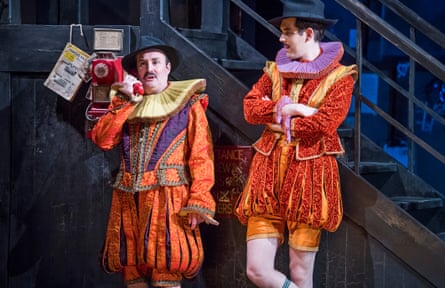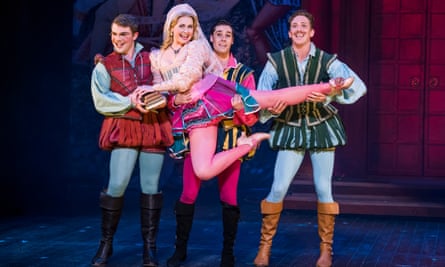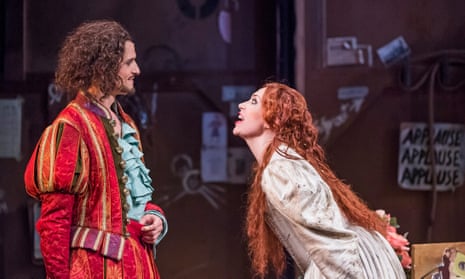What is the best musical based on a Shakespeare play? Many would plump for Bernstein’s West Side Story, others for Rodgers and Hart’s The Boys from Syracuse. My own vote would go to this 1949 Cole Porter show, lovingly revived by Opera North, in that it boasts a ravishing score while deftly interweaving The Taming of the Shrew and a ferocious backstage battle.
A lot of the credit belongs to the book by Bella and Samuel Spewack, which in some ways, actually improves on Shakespeare. It certainly drains the original of its barbarism. In addition, by focusing on the ongoing war between the vainglorious actor-manager Fred Graham and his ex-wife Lilli during a tour of a musicalised Shrew, it gives the action a Pirandellian complexity. At the same time, it motivates the violence on stage. Kate’s first encounter with Petruchio normally has a coarse brutality. Here, Kate’s vituperation is given extra spice by Lilli’s discovery of Fred’s infatuation with a perky soubrette. For a moment, you are not sure whether you are watching Kate’s explosive fury or that of the lacerating Lilli.

The show’s ability to exist in two worlds – that of showbiz shenanigans and Shakespeare’s comedy – is richly exploited by Porter’s music and lyrics. Bianca’s delightful song about her triple suitors – Tom, Dick or Harry – starts with a madrigal-like purity and ends with her obvious, reiterated delight in Dick. Similarly Petruchio’s Where Is the Life That Late I Led manages to rhyme “puberty” with “Shuberty”, alluding to the Broadway theatre owner, while offering a catalogue of the hero’s Italian conquests famously including Lisa “who gave new meaning to the leaning tower of Pisa”.
The joy of Jo Davies’s production, first seen in 2015 and now revived by Edward Goggin, is that it too offers a double perspective. Another Op’Nin, Another Show beautifully captures the bustle and chaos of an out-of-town tryout and Too Darn Hot simmers with the sexual fever of a company on the road. Yet Will Tuckett’s choreography, revived by David James Hulston, nods towards Romeo and Juliet in its recreation of boisterous Italian street life and Colin Richmond’s designs are based on the exquisitely picturesque murals of the Renaissance artist, Benozzo Gozzoli.

The cast is also drawn from two worlds – that of opera and musicals – and for once the blend works. Quirijn de Lang as Fred/Petruchio and Stephanie Corley as Lilli/Kate both excel at showing the buried passion beneath the surface rage. Zoë Rainey as the lubricious Lois/Bianca, Alan Burkitt as her nimble-footed partner and Joseph Shovelton and John Savournin as the Shakespeare-loving gangsters all hit the right notes and James Holmes conducts a first-rate pit orchestra. You could argue that Porter, by setting Kate’s final speech to rhapsodic music, camouflages its dubious content. Otherwise this show confirms the truth of Tranio’s observation that “No profit grows where is no pleasure taken” and proves itself yet again the pinnacle of song-and-dance Shakespeare.

Comments (…)
Sign in or create your Guardian account to join the discussion